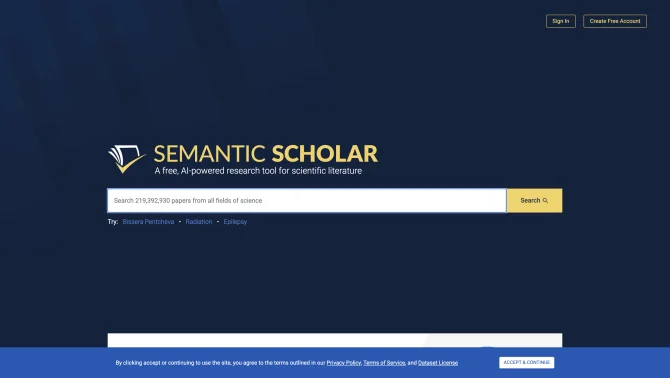Introduction
Semantic Scholar, developed by the Allen Institute for AI, is a groundbreaking AI research tool that employs advanced algorithms to comprehend the semantics of scientific literature. This platform not only accelerates the process of discovering relevant research but also enhances the understanding of complex academic concepts. With its user-friendly interface, Semantic Scholar allows scholars to navigate through millions of papers with ease, providing a seamless experience from search to citation analysis.
background
The Allen Institute for AI, the force behind Semantic Scholar, is a non-profit research organization dedicated to contributing to the advancement of AI for the benefit of all. Their creation, Semantic Scholar, has been pivotal in democratizing access to scientific literature, ensuring that knowledge is accessible to researchers worldwide, regardless of their institutional affiliation or funding.
Features of Semantic Scholar
AI-Driven Search
Semantic Scholar's AI algorithms provide precise search results by understanding the context and semantics of scientific literature.
Citation Analysis
The platform offers comprehensive citation analysis, including a visual citation graph that illustrates the interconnections between papers.
Personalized Recommendations
Based on user search history and preferences, Semantic Scholar recommends relevant and recent papers, keeping users updated with the latest research.
Research Trends Analysis
It provides insights into trending topics and research directions, aiding researchers in identifying emerging areas of interest.
Open Access and Data Sharing
Semantic Scholar promotes open science by offering free access to a vast array of papers and datasets for the research community.
How to use Semantic Scholar?
To use Semantic Scholar, begin by entering relevant keywords into the search bar. Refine your search using filters such as publication date, authors, or research field. Utilize the citation graph to explore the impact and context of a paper. Save papers of interest and utilize the personalized recommendations to stay abreast of new research.
Innovative Features of Semantic Scholar
Semantic Scholar's innovative approach lies in its AI-driven search capability that goes beyond keyword matching to understand the underlying concepts and context within scientific literature, facilitating a deeper and more meaningful discovery process.
FAQ about Semantic Scholar
- How does Semantic Scholar ensure the quality and accuracy of search results?
- It uses state-of-the-art AI algorithms to analyze and understand the content of scientific literature, ensuring high-quality and relevant search results.
- Can I access full-text papers through Semantic Scholar?
- Yes, Semantic Scholar provides access to many open-access papers for free. For others, it offers links to publishers where full texts can be obtained.
- Does Semantic Scholar support literature management and citation?
- Yes, users can create accounts to save papers and Semantic Scholar supports multiple citation formats for academic writing.
- How does the personalized recommendation system work?
- The system analyzes user search history and reading habits to recommend new papers that align with user interests.
- What should I do if I find incorrect information on Semantic Scholar?
- Report the error through Semantic Scholar's feedback system for review and potential database updates.
- Is there a mobile app for Semantic Scholar?
- While there is no dedicated mobile app, the website is responsive and can be accessed via mobile browsers for a good user experience.
- How does Semantic Scholar handle user data and privacy?
- It adheres to data protection regulations and has a clear privacy policy outlining its data handling practices.
Usage Scenarios of Semantic Scholar
Academic Research
Use Semantic Scholar to find and analyze papers relevant to your field of study, track citations, and discover emerging trends.
Market Analysis
Leverage the tool to monitor scientific developments that may impact industry trends and innovation.
Literature Review
Conduct comprehensive literature reviews by utilizing Semantic Scholar's search and citation analysis features.
Educational Purposes
Instructors and students can use it to explore case studies and enhance learning in various scientific disciplines.
User Feedback
Users have reported that Semantic Scholar significantly streamlines the literature review process, making it easier to find and analyze relevant academic papers.
Researchers have praised the platform for its ability to quickly return high-quality search results, saving them considerable time in their research.
Scholars appreciate the detailed citation analysis, which helps them understand the impact and context of their research within the academic community.
Many users have found the personalized recommendations to be highly relevant, aiding them in staying updated with the latest research in their field of interest.
others
Semantic Scholar stands out for its commitment to open science, providing free access to a wealth of scientific literature and data. The platform's advanced AI capabilities have been instrumental in transforming the way researchers discover and engage with scholarly content.
Useful Links
Below are the product-related links, I hope they are helpful to you.
